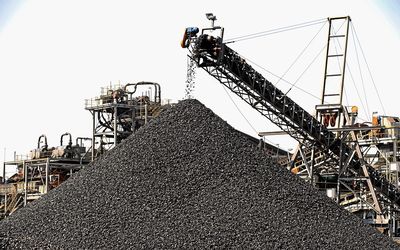Study shows that carbon tax may spur growth
by Franz Wild and Simbarashe Gumbo,
2015-11-24 11:17:18.0
SOUTH Africa’s proposed carbon tax will boost growth in the economy provided the revenue is reinvested in green-energy projects, according to Folsom, California-based Applied Development Research Solutions.
The government is completing a law to tax emissions and help it meet a target to reduce greenhouse gases by 34% below a "business as usual" scenario in five years and by 42% by 2025. The tax will start at R120/metric ton of carbon dioxide equivalent emissions and increase by 10% a year until 2019. The law will probably come into effect in about a year and would add to costs for the nation’s biggest polluters such as Eskom and oil company Sasol.
The Chamber of Mines says the tax will harm investment in the economy and undermine an industry battling rising costs and low commodity prices. The Treasury estimates that less than half of emissions will actually be taxed. It projects the initial effect on gross domestic product (GDP) to be "marginally negative", but will improve as it uses the revenue to reduce other taxes and provide incentives for green-energy projects.
ADRS, an economic-modelling group, shows in its forecasts that economic growth and household spending could be boosted through tax recycling measures. It based its study on the assumption that half of the revenue from the carbon tax will go into the government’s infrastructure-investment budget for "greening" the economy, and the remainder towards investment by state-owned companies in green technology and services.
According to the ADRS model, average annual economic growth from 2015-2030 will be 2.4% if the government introduces the tax without supporting measures, compared with an estimated 3.1% without the charge. Reinvesting the revenue will boost expansion to 4.3% a year.
Investment in the primary sector, most of which is mining and agriculture, could swing to negative from positive, even with the tax recycling measures.
Growth in investment in the economy would more than halve because of the effect of the carbon tax. Recycling the revenue could boost average investment growth to about 6%.
Growth in household income would also be lifted by reinvesting the income from the tax.
Bloomberg

COUNTING THE COST: A pile of coal is seen at Exxaro Group’s Inyanda Coal Mine in Witbank. The mining company estimates that the carbon tax will cost it about R100m a year. Picture: ROBERT TSHABALALA
SOUTH Africa’s proposed carbon tax will boost growth in the economy provided the revenue is reinvested in green-energy projects, according to Folsom, California-based Applied Development Research Solutions.
The government is completing a law to tax emissions and help it meet a target to reduce greenhouse gases by 34% below a "business as usual" scenario in five years and by 42% by 2025. The tax will start at R120/metric ton of carbon dioxide equivalent emissions and increase by 10% a year until 2019. The law will probably come into effect in about a year and would add to costs for the nation’s biggest polluters such as Eskom and oil company Sasol.
The Chamber of Mines says the tax will harm investment in the economy and undermine an industry battling rising costs and low commodity prices. The Treasury estimates that less than half of emissions will actually be taxed. It projects the initial effect on gross domestic product (GDP) to be "marginally negative", but will improve as it uses the revenue to reduce other taxes and provide incentives for green-energy projects.
ADRS, an economic-modelling group, shows in its forecasts that economic growth and household spending could be boosted through tax recycling measures. It based its study on the assumption that half of the revenue from the carbon tax will go into the government’s infrastructure-investment budget for "greening" the economy, and the remainder towards investment by state-owned companies in green technology and services.
According to the ADRS model, average annual economic growth from 2015-2030 will be 2.4% if the government introduces the tax without supporting measures, compared with an estimated 3.1% without the charge. Reinvesting the revenue will boost expansion to 4.3% a year.
Investment in the primary sector, most of which is mining and agriculture, could swing to negative from positive, even with the tax recycling measures.
Growth in investment in the economy would more than halve because of the effect of the carbon tax. Recycling the revenue could boost average investment growth to about 6%.
Growth in household income would also be lifted by reinvesting the income from the tax.
Bloomberg




















Change: 0.61%
Change: 0.44%
Change: 0.26%
Change: 0.65%
Change: -0.22%
Data supplied by Profile Data
Change: 0.88%
Change: 0.01%
Change: 0.61%
Change: 0.00%
Change: -0.01%
Data supplied by Profile Data
Change: 1.13%
Change: 0.83%
Change: 0.86%
Change: 1.05%
Change: 0.62%
Data supplied by Profile Data
Change: 0.09%
Change: 1.01%
Change: 0.63%
Change: 0.53%
Change: -1.64%
Data supplied by Profile Data